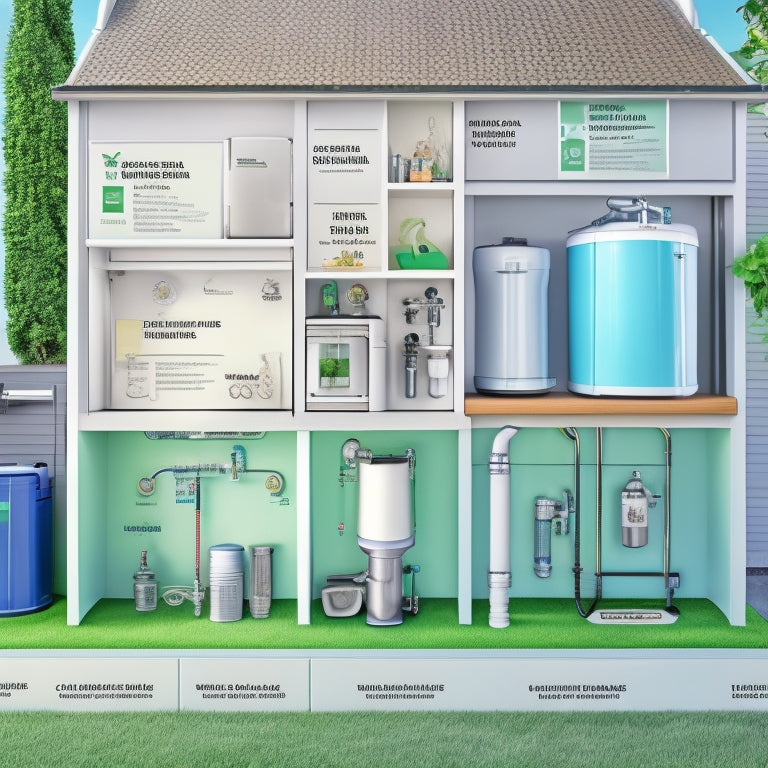
Claim Government Rebates on Water Heating Systems
Share
You can claim government rebates on water heating systems, reducing your upfront costs and incentivizing the adoption of energy-efficient options. Federal tax credits cover up to 30% of installation costs, while state-specific programs offer rebates ranging from $200 to $1,000. To qualify, verify your system meets efficiency standards, such as a minimum SPF for heat pumps. Gather necessary documentation and complete application forms to apply. By taking advantage of these rebates, you can notably lower your energy consumption and utility bills. Now, find out the specific incentives available for your system and take the next step towards maximizing your savings.
Key Takeaways
- Government incentives, including rebates and tax credits, promote the adoption of energy-efficient water heating systems, like solar and heat pumps.
- Eligibility for rebates depends on meeting specific efficiency standards, such as SPF ratings for heat pumps and Energy Star certification.
- Federal tax credits can cover up to 30% of installation costs, while state-specific rebates offer additional savings, up to $1,000 in some cases.
- To apply, gather necessary documentation, ensure compliance with eligibility criteria, and complete application forms available on agency websites.
- Review applications carefully to prevent errors or omissions and wait for processing to receive rebate refunds.
Government Incentives for Solar Water Heaters
You can benefit from government incentives when installing solar water heaters in your home or business. These incentives are designed to encourage the adoption of renewable energy sources, reducing our reliance on fossil fuels and mitigating the environmental impact of traditional water heating systems.
Recent solar technology advancements have made solar water heaters more efficient and cost-effective, making them a viable option for many homeowners and businesses. By integrating solar power into your water heating system, you can reduce your grid reliance by up to 70% renewable energy integration, leading to significant cost savings.
Additionally, you can claim government rebates and tax credits, further reducing the upfront cost of the system. By installing a solar water heater, you can reduce your energy consumption and lower your utility bills.
Heat Pump System Rebate Eligibility
Heat pump systems offer another avenue for reducing energy consumption and claiming government rebates. You can qualify for rebates by installing a heat pump system that meets the required efficiency standards.
| Heat Pump Type | Efficiency Requirement |
|---|---|
| Air-source heat pumps | Minimum Seasonal Performance Factor (SPF) of 2.5 |
| Ground-source heat pumps | Minimum SPF of 3.3 |
| Hybrid heat pumps | Minimum SPF of 2.8 |
Federal Tax Credits for Water Heating
Federal tax incentives can markedly offset the cost of upgrading to energy-efficient water heating systems.
As you consider installing a new water heater, you'll want to take advantage of these credits to minimize your out-of-pocket expenses. Much like the up to 75% funding for EV chargepoint installation, the federal government offers a tax credit of up to 30% of the total installation costs for qualified energy-efficient water heating systems.
This can greatly reduce the upfront cost of installing a new system, making it more affordable for you to upgrade to a more energy-efficient model.
State-Specific Water Heater Rebates
Beyond federal incentives, many states offer additional rebates and incentives for installing energy-efficient water heating systems, bringing the cost of upgrading even lower. You can take advantage of these state programs to maximize your savings.
| State | Rebate Amount | Eligible Systems |
|---|---|---|
| California | Up to $1,000 | Solar water heaters, tankless water heaters |
| New York | Up to $500 | Energy Star certified water heaters |
| Texas | Up to $300 | High-efficiency gas water heaters |
| Florida | Up to $200 | Solar water heaters, heat pump water heaters |
How to Apply for Government Rebates
Your wallet is about to get a welcome enhancement: you're ready to apply for government rebates on your new water heating system.
Federal incentives, such as tax credits and grants, can also offset the upfront costs of adopting electric vehicles, federal and state incentives for instance, which can be combined to maximize savings.
To begin the application process, gather all rebate documentation, including proof of purchase, product specifications, and installation details.
Make certain you meet the eligibility criteria outlined by the government agency offering the rebate.
Complete the application form, which can usually be found on the agency's website, and submit it along with the required documentation.
Be sure to review the application carefully to avoid errors or omissions that could delay processing.
Once submitted, wait for the rebate to be processed and receive your refund.
Frequently Asked Questions
Do I Need to Replace My Entire Water Heating System to Qualify?
You're wondering if you need to replace your entire water heating system to qualify for rebates. Fortunately, you don't; upgrading to a new energy-efficient water heater or making energy efficiency upgrades can extend your water heater's lifespan and still qualify.
Can I Claim Rebates for a Water Heater Installed in a Rental Property?
You're wondering if you can claim rebates for a water heater installed in a rental property. Generally, you're eligible as long as you're the property owner and meet water heater eligibility criteria, but rental property considerations may affect your rebate amount.
Are Heat Pump Systems More Expensive Than Traditional Water Heaters?
You'll find that heat pump systems are generally more expensive upfront, but they offer superior energy efficiency, reducing your long-term energy costs; a cost comparison reveals they can save you money in the long run.
Can I Combine Government Rebates With Manufacturer Discounts?
You're on the cusp of maximizing savings, wondering if you can combine government rebates with manufacturer discounts. The answer is yes, but only if you meet rebate eligibility criteria, allowing you to stack discounts and amplify your cost savings.
How Long Does It Take to Receive My Rebate After Applying?
You'll typically receive your rebate within 6-8 weeks after applying, but this timeline may vary depending on the rebate processing efficiency and application volume, so be patient and track your application status for updates.
Related Posts
-

3 Best Solar-Powered Biodegradable Accessories for Your Home
You're taking a significant step towards a more sustainable lifestyle by incorporating solar-powered biodegradable ac...
-

What Are Natural Clay Paints for Green Home Interiors?
You're about to uncover a game-changing alternative to synthetic paints that not only enhances the aesthetic of your ...
-

10 Grid-Tied Wind Power Systems for Modern Homes
You're looking for a grid-tied wind power system to utilize wind energy for your modern home. Here are ten options to...


